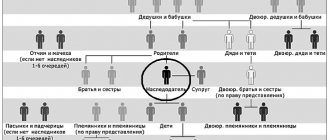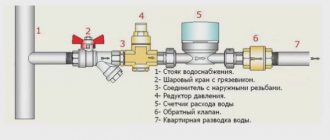How to find out about inheritance?
A will is a legal document containing the instructions of the maker (the testator, or testator) regarding the property left behind.
The testator must have legal capacity , which usually means he or she has reached the age of majority.
But if a person was addicted to alcohol, drugs or gambling, or could not understand his actions due to mental disorders, the court could declare him incompetent .
Then the will is declared invalid .
Most often, a person signs a will in the presence of a notary , then it is certified by a seal and entered into the register.
In special situations, the signature can be affixed by the head physician of the hospital , the commander of a military unit and some other persons.
The will names the people who receive or lose property . The deprivation can be written directly, or the person may not be included in the description of the heirs. Then there is still the possibility of obtaining unmentioned property.
The law also provides for a number of relatives a mandatory share of the inheritance , regardless of the wishes of the testator.
These are:
- children under adulthood or disabled;
- parents or spouse who are unable to work;
- disabled people supported by the testator.
They receive at least half of what is required by law. After the will has been fully drawn up, the testator is free to change it, cancel it or rewrite it.
Why look for a will?
The heir’s lack of information about the existence of an expression of will results in the impossibility of entering into inheritance.
Possible situations:
- The heir is an outsider . He may not know the testator's family members or may not have information about the death of the owner. Therefore, the testator must take care of transferring the order to the potential heir. Otherwise, the relatives of the deceased citizen may simply hide the fact that the administrative document was drawn up.
- The heir is a relative of the deceased. Relatives usually have access to documents or personal belongings of the deceased person. But failure to contact a notary in a timely manner will result in loss of property rights.
Example. Citizen M. transferred his property to his brother. A year later he died. The son found out about his father's death and came to the city. He held his parent’s funeral and took the keys to the apartment from his uncle. The young man found an order in the documents and tore it up. Within the prescribed period, he submitted an application to accept the inheritance. The brother of the deceased man could not contact the notary, since he was the heir of the 2nd line. However, he knew where the declaration of will was drawn up. Therefore, I turned to a notary and took a duplicate of the document. Later, the man filed an application to become a driver. The testator's apartment went to him. The son was left without an inheritance.
Peculiarities
These include:
- Both a person's property and his debt . The heirs are obliged to either agree to the inheritance of both points, or to renounce everything. Debts are also transferred to one person in case of voluntary consent;
- It is possible to stipulate a condition according to which, if a person died at the time of disclosure of the will or renounced his share, it will be transferred to another person mentioned in the will;
- The will can stipulate a condition that must be fulfilled in order to receive the inheritance;
- The inheritor may be assigned a property obligation in relation to another person or a number of persons , for example, granting the right to reside in the inherited apartment. Also, the testator may indicate by his will other duties to be performed by the heirs;
- If several people inherit movable property, they can usually decide for themselves how it will be used. But a will can determine this issue in advance >;
- If the testator owns a non-privatized apartment, then he does not have the right to pass it on by inheritance. However, members of his family may live there.
Read about who the heirs by right of representation are in the article.
According to the ongoing reform of inheritance law, some more features appear.
It is worth paying attention to the following:
- From September 1, 2020, it will be possible in a will to oblige the heirs to do something not related to public benefit , for example, indicate a burial place.
- From July 1, 2020, amendments will come into force allowing spouses to draw up one will for both >;
- Then it will be possible to conclude an inheritance agreement . This document is signed by the testator’s relatives, government organizations and other legally authorized persons.
According to it, the future heir is obliged to fulfill certain conditions during the life of the testator or after his death. When concluding such an agreement, you can be sure of the existence of an inheritance, but what is included in it will become known only after official disclosure.
Where is the will kept until death?
The deed of the testator's last will is drawn up in two copies, one of which remains with the notary, and the other with the testator. The notary keeps the document for 75 years and, in case of resignation earlier, transfers the will to another notary. Only after the expiration of the established period is the paper sent to the state archive.
The copy issued to the testator can be located anywhere, but most often - among his personal belongings, possibly together with other documents. It can also be transferred to another person, for example, an executor of the will, who, after the death of the testator, carries out his instructions regarding the distribution of property.
In accordance with Articles 1127 and 1129 of the Civil Code of the Russian Federation, not only a notary has the right to certify a will. In unusual situations, the following persons acquire this authority:
- the head physician of the medical institution (his deputy or the doctor on duty);
- captain of a ship flying the flag of the Russian Federation;
- director of a nursing home (chief physician);
- head of an expedition, Antarctic station or field base;
- commander of a military unit (in the absence of a notary at its location);
- warden;
- random witnesses (in emergency situations).
This means that the document can be stored with them, although the likelihood of this is low: clause 3 of Art. 1147 of the Civil Code of the Russian Federation establishes that the person who certified the will is obliged to send the paper to the notary at the place of residence of the deceased at the first opportunity.
Where is it stored?
In accordance with the legislation of the Russian Federation, a will must be drawn up in 2 copies. The notary transfers the original document to the testator, who keeps it at his own discretion.
Depending on personal wishes, the testator can leave it at home, give it to a trusted person, or keep it in a safe deposit box. As for the copy of the will, it remains with the notary and is kept in the notary's office until the death of the testator.
Responsibility for the safety of the document lies with the notary who certified the paper, and with the testator himself.
Which notary should I contact?
How to find out which notary to contact to enter into an inheritance? In the event of the death of the owner, the inheritance case is opened at the place of last registration of the deceased. If there is an expression of will, the inheritance case is opened at the place where the document is stored.
If there are several recipients, then the inheritance case is opened with the notary whom the first of the heirs contacted. Other relatives must submit an application to the same notary office.
How to find out which notary has opened an inheritance case?
Since 2020, this can be clarified through the online service. To do this you need:
- go to the website of the Federal Notary Chamber or follow the link https://notariat.ru/ru-ru/help/probate-cases/;
- fill out the search form;
- Click on the “Find Case” button.
You must enter your full name in the search form. the testator, his date of birth and death. If the information is contained in the register, the online service will provide information about the notary who is handling the case.
What to do with a will
After the document is found, the heir must contact the notary with a statement within the prescribed period. In it, the citizen must express his opinion regarding the property of the deceased. The heir may accept the property or refuse to accept it simply or in favor of one of the other recipients.
Important! The will is verified against the unified register. After which the notary puts a mark on the form indicating its validity. The same procedure is carried out in relation to a document found at the deceased’s home, in a hospital and other places.
If a document is closed and hidden, is it possible to inquire about its existence?
In the case of a closed will, each heir has the right to learn only about that part of the property that is bequeathed directly to him.
A package of documents for a request to a notary office
In order for the notary to reveal all the cards, you must provide the following package of documents:
- Death certificate of the testator.
- Your passport.
- All documents that confirm your family ties. This is a birth registration certificate and a marriage registration certificate, certificates of cohabitation, documents confirming a change of surname, certificates confirming being a dependent.
If the local notary does not have the administrative document of the deceased person, you should make a request to the notary chamber of your region, district or region. Copies of all the above documents must be attached to the request. This method is ideal for those who live far from the testator.
To be on the safe side, you should send a registered letter with notification. This way you will be sure that it has been delivered and you will receive a response.
If documents confirming family ties are lost, you can contact the civil registry office to restore them. If it was not possible to obtain them in this way, then the court will help confirm family ties.
How does a notary find out about the death of the testator?
Interested parties in acquiring an inheritance are relatives and close people of the deceased. To register an inheritance, they need to contact a notary's office with an application to accept the inheritance. A death certificate is provided as proof of the opening of an inheritance. This is how the notary learns about the death of the testator.
If there are no interested parties, after six months the property becomes the property of the state, that is, it becomes escheat. If the heirs missed the deadline for accepting the inheritance for good reasons, they will be able to restore it by going to court.
Can a notary hide data?
Based on Article 61 of Federal Law No. 4462-1 “On Notaries” dated February 11, 1993, the notary’s duties include notifying the heirs about the opening of the case.
Article 61 of Federal Law No. 4462-1 “On Notaries”. Notification of heirs about the opened inheritance
A notary who has received a message about the opening of an inheritance is obliged to notify about this those heirs whose place of residence or work he knows.
The notary can also summon the heirs by placing a public notice or reporting it in the media.
He can notify interested parties in two ways:
- by personally notifying about this (if the contacts of the heirs are known);
- by posting a public announcement (in the media).
In accordance with the Fundamentals of the legislation of the Russian Federation on notaries, approved by the Supreme Court of the Russian Federation dated February 11, 1993 No. 4462-1, concealment of such information is fraught with deprivation of a license.
How can a non-relative find out about a will?
For an applicant relying on an inheritance under a will, access to the death certificate of the deceased may be closed by the heirs by law. In this case, he needs to apply for a duplicate certificate at the registry office. But if there are no family ties with the testator, he can receive a copy of the document only through a request sent to the authority by a notary, lawyer, or representatives of the justice authorities.
Required documents
The following documents must be provided to the notary office at your place of residence or to the one in which the will left by the deceased was discovered:
- Death certificate of the testator;
- Certificates or certificates confirming the existence of family relationships between the parties to the transaction;
- Documents evidencing the testator's ownership of certain property;
- A handwritten statement in which other relatives who are heirs renounce the property, if such a refusal occurs;
- Passport of the deceased person or other document that can serve as proof of his identity;
- Will;
- Title and technical documents for real estate, transferred property;
- Application for registration of inheritance.
Any person interested in receiving the property can file a claim in court, on the basis of which the will may be declared invalid.
However, you will need to prove your relationship with the deceased. The process of searching for a will can be very lengthy. Sometimes a document cannot be found even after a thorough search, which leads to the conclusion that it does not exist. In this case, inheritance will be carried out on the basis of the norms of the Civil Code.
Features of drawing up a will are discussed in the article: drawing up a will. Find out how to draw up a will for an apartment here.
The procedure for inheriting an apartment under a will is described in this article.
Where to look and where to contact?
You can search:
- At the place of residence of the deceased.
Most often, evidence of the last will is kept at home by elderly people. Necessary:- carefully inspect cabinets, safes and storage rooms;
look into a box or bag with important documents.
- If there is no will in the house of a deceased person, you must contact the notary office located at his place of residence.
The notary will have to present a document confirming blood relationship with the deceased, depending on the family ties. You must also have a death certificate with you, a copy of which the notary will require for further work. If a deceased relative made a will with a notary at the place of residence, the inheritance case will be opened on the day of application. - If the nearest notary office does not have the document, you need to look for it in other offices in the city. Any notary can tell you how to find out about the existence of a will and where it can be stored, where to go and what documents to collect.
In order not to visit all the notaries in order to search for a document, it is advisable to contact the notary chamber of the region of the Russian Federation where the deceased lived.By law, all notaries must report to the chamber on the transactions they have completed during the entire period of their work.
- In addition to a notary, a will can be certified:
- the chief physician of the hospital where the deceased was treated;
commander of a military unit;
- head of the expedition.
- After the introduction of a unified register of wills, any person can find out about the existence of an inheritance case using the full name of the deceased person.
It is also possible to inquire about which notary certified this document and where it is located.
If the deceased was in one of the above institutions before his death, you can go there;
Where can I find out about a will for inheritance after death?
Most often, the testator draws up a document to inherit his own property at his place of residence. In this case, finding out about its existence is quite simple: you just need to submit a request to the notary office closest to the place of residence of the testator.
However, according to the law, citizens have the right to leave it with any notary of their choice. In such circumstances, you need to start looking for him at your place of registration. Persons who have provided the notary with a death document or a copy thereof have the right to make a request.
If you have problems finding a document through notaries, you should look for it in the apartment of the deceased: one copy should be kept by the testator.
If these actions do not bring results, we can advise you to do the following: send an official request to the notary chamber of the region: district, region, etc. This institution is a higher authority, and notaries submit all information on the preparation of documentation there.
How to find out whether a will was left during the testator’s lifetime
Relatives of older people are wondering how to find out if there is a will for an apartment or valuables. But the notary, translators, witnesses and persons with access to the electronic system databases do not disclose information. If they violate the secrecy of the will, the citizen who made it will go to court and receive compensation for moral damage. The notary will be expelled from the Federal Chamber, and he will not be able to continue his professional activities. Thanks to strict punishment, the likelihood of secrets being revealed is minimal.
It happens that relatives do not know whether the testator is alive. The notary should not clarify this nuance: clarify the information yourself by contacting the registry office.
Where and how to look for a will during the testator’s lifetime
To find out whether a relative has drawn up a will, carefully ask him a question. Information obtained from other sources is considered illegal. But you have no right to demand an answer if the current owner refuses to inform you.
How to find out if a will has been drawn up: good advice
If you are not relatives of the deceased, then try to maintain friendly relations with them. Learn about their lives, visit them and help them. Be interested in their lives and try to join their circle so much that they become attached to you. Many will say, how can this help you find out if there is a will? How to join a family where you are strangers? And, undoubtedly, they will be right. After all, not everyone will welcome a new guest, especially knowing that the inheritance of a close relative will go to a stranger. But there are exceptions to the rules. It’s worth a try, especially as they say, those who don’t take risks don’t drink champagne.
If the relatives of the deceased are kind and sympathetic people, then they will definitely invite you to the funeral and tell you about your rights to inheritance.
How to find out if there is a will?
There are 2 ways to find out about the existence of a will:
- Search for a will at the place of the testator's last residence. When concluding a will, one copy remains with the notary, and the second is given to the testator and is often kept at home in documents. If possible, you can independently search for the will in the apartment. A search is also possible if the deceased drew up a document in an emergency situation.
- Contacting a notary. You need to contact any notary office in the country. If a notary assures you that there is no will, this does not mean that there is no will at all. The deceased could simply not register it, in which case the first option will suit you better.
Algorithm of actions at the stage of clarifying information with a notary:
- contacting a notary office;
- preparation of the necessary documents (original and copy of your passport, marriage/birth certificate, as confirmation of family ties, death certificate of the testator);
- writing a petition to open an inheritance;
- familiarization with the list of property;
- acceptance or refusal of one's share.
At the stage of opening an inheritance, the notary checks the universal database, where he specifies information about the existence of a will. After this, the will is opened, checked for compliance with the law and read to the heirs. If the will is not annulled or declared invalid, then the distribution of property occurs on the basis of an administrative document.
How to find out if there is an inheritance?
Upon learning of the death of a relative, the heir must contact the notary's office located at the registered address of the deceased testator.
Ways to obtain information about inherited property:
- ordering an extract from Rosreestr about all real estate owned by the testator (a copy of the deceased person’s passport will be required);
- sending a request to the Federal Tax Service to obtain information about the bank deposits of the testator;
- Traffic police – obtaining data on vehicles;
- attracting private companies that provide paid services for searching for the testator’s valuables.
By last name
You can obtain information if you only know the last name of the testator in the following ways:
- Personal application to the nearest notary office. Having only the original of his passport with him, a person writes a written application to clarify the data on the death of the testator. The notary, using access to a unified system, checks information about the existence of a will and the death of a relative. You can obtain detailed information only after providing the original document on the person’s death.
- Contacting a private company that provides inheritance tracing services. The company operates on the basis of a contract signed with close relatives or strangers and receives a monetary reward.
Outside Russia
In the event of the death of a testator permanently residing outside of Russia, finding an inheritance turns out to be quite difficult.
Potential heirs can use one of the following methods of acquiring valuables:
- personal application to the country's consulate with documents confirming relationship (valid for a total period of 6 months);
- attracting a private company to search for inheritance (doing work outside Russia is more expensive than providing services in the Russian Federation).
You should not rely on foreign relatives, since in 30% of cases facts of deliberate concealment of the death of the testator are recorded.
How to find out if you are included in the will
The division of areas between notaries is carried out either according to the territorial structure, or according to information arranged in alphabetical order. And in accordance with the law, citizens have the right to use the services of any notary, regardless of their place of residence.
A will can also be drawn up not at a notary, but at one of the law firms. In the event that you do not have time to search for the notary office where the document was drawn up, contact a higher authority.
The notary chamber receives information about all operations carried out by notaries in the region. In such an institution there will be a greater likelihood of finding answers.
Non-relative If a non-relative applies to the notary chamber, it will be more difficult to obtain approval of the request and find out about the existence of a will. The timing of consideration of the application also depends on the degree of relationship.
If it turns out that a given notary does not have a will of the deceased, this does not mean that it does not exist in principle. The fact is that citizens are not at all obliged to register a will with a notary in their jurisdiction.
They can do this in absolutely any office they wish.
Also, according to the law, not only a notary, but also authorized persons have the right to have a will certified: the head of a military unit, the head physician, the director of a nursing home, the captain of a ship.
This option is allowed if the document is signed under extreme conditions. Therefore, if the testator was in the hospital for a long time before his death, then you can go there to search for a will.
Request to the notary chamber In the process of searching for a will, you can submit a request to a higher authority, which oversees the work of all notary offices in the region or district.
We are talking about the notary chamber.
How to find out about a will?
Important
To receive a response to the request, the following acts should be collected:
- applicant's passport;
- death certificate of the testator;
- documents proving the fact of relationship with the deceased testator (marriage or birth certificate).
These documents must be submitted to a notary office. The notary at the last place of residence of the testator will deal with the inheritance matter.
In some regions, powers between these persons are divided alphabetically (last name of the testator), and in some - by territory. Contact any office at the place of registration of the testator.
Perhaps it was certified by another notary. This is not prohibited by law.
How and where to find out about the presence of a will?
By law, all notaries are required to report there about all transactions made by them at their workplaces. Download from us a sample application for searching for a will.
Also check out the sample - Sample of a completed application for searching for a will. 4 Article 1127 of the Civil Code of the Russian Federation states that a will can be certified not only by a full-time lawyer, but also by other officials. These are: the chief physician of the hospital where the patient was treated, the director of a nursing home, the commander of a military unit, the head of the expedition.
It is worth contacting them if the deceased was in one of the above-mentioned institutions before his death. If a person wants his relatives not to look for a will in the future, then he needs to discuss its possible presence or absence with them in advance.
How can I find out if a deceased person has a will?
However, if the property is abandoned in your favor, you will have to accept the inheritance before the expiration of 3 months from the date of refusal. Didn’t manage to receive the deceased’s property due to you during this period? The right to receive property will have to be restored through the courts.
How to find out where the will is located: Step 1 To make sure that the death directive exists, first look around the apartment. Look especially carefully in those places where the testator kept money and valuable documents.
However, remember that relatives who lived with the testator sometimes hide the paper on purpose: if the heirs under the will do not declare their rights, the property will be received by the heirs by law. Step 2 If you cannot find the document, contact a notary at the place of residence of the deceased.
How to find out if there is a will after death?
The answer is announced to relatives faster. For an apartment If persons entered into an agreement on the shared division of housing, which belonged to them and the heir by right of common ownership, where there is a minor child, permission from the guardianship and trusteeship authority will be required. Procedure You should follow this procedure:
- Obtain the person's death certificate.
- Take a certificate from the passport office about its deregistration.
- You will also need an extract from the house register, which will confirm that you lived with the citizen until his death.
Here you can apply for acceptance of inheritance.
How to find out about a will after the death of a relative
After the death of the testator How can I find out if there is a will before the death of the testator? This is realistic only in one case - if the testator himself talks about the document. The notary provides information about the existence of an inheritance if the heirs present a death certificate of the testator.
The same document is attached to requests that are sent to notary offices. Also, the heirs must prove the fact of relationship with the testator by submitting the relevant acts.
Attention
For an apartment Searching for a will for an apartment is no different from other cases. The heirs must take all steps to find the document, including sending requests to notary offices.
Which notary should I contact? First of all, you need to contact the notary at the last place of residence of the testator.
How to find out if there is a will
The inheritance case is formalized by a notary who carries out his activities at the last place of residence of the deceased. This information is determined by certificates from the HOA and the passport office. It should be taken into account that the powers of notaries are divided either alphabetically (by the last name of the testators) or by territory.
To accurately determine who will conduct the business, you need to contact any notary office. It will not be possible to obtain information about the existence of a will before the death of the testator.
This is defined in Article 1123 of the Civil Code of the Russian Federation. This rule states that neither the notary, nor the witnesses, nor the developers of the will should disclose its contents and the fact of its existence until the opening. Legislative framework Issues of disclosure of inheritance are defined in the Civil Code of the Russian Federation. In particular, this legal act enshrines the principle of secrecy of a will.
How to find out if a will has been made
If so, it's worth visiting these establishments and talking to their staff. Step 3. We send a request to the notary chamber. If the will was not found either in the apartment of the deceased or in one of the notary offices at his place of residence, then the next step has to be taken.
You can continue your search blindly, visiting all the notaries in the city one by one, but it is easier and more reasonable to send a written request directly to the notary chamber of the region, territory or district. Data on all transactions concluded by notaries in this administrative territory is recorded here.
Taking such a step will be more effective than going through all the notary offices in the city one by one.
Such a request is quite convenient, as it allows you to immediately obtain information about the existence of a will without personally visiting all the notaries in the region. To formulate a request, it is necessary to submit documents confirming the identity of the applicant and the details of the testator. It is submitted in person or by mail.
It is worth noting that even if a will is found, but the name of the person looking for this document does not appear in it, then the notary chamber has no right to disclose the composition of the heirs according to the document and the contents of the will. In any case, you won’t have to wait long for information about who the deceased bequeathed all his property to. Otherwise, the notary will read the entire document out loud.
To obtain the right to property, you will have to pay a state fee. The fee is calculated directly by the notary who is handling the inheritance case. It is 0.6 percent of the market value of the property (no more than a million rubles), or 0.3 percent (no more than one hundred thousand rubles).
A duty of 0.3% is paid only by heirs who, by law, are closest relatives (first and second priority). What to remember
- When inheriting real estate (apartment, house, land), you must also provide property documents and an appraisal certificate.
- If documents confirming the relationship with the deceased are lost, restore them by contacting the registry office at the place of residence of the testator.
Source: https://dtpstory.ru/kak-uznat-vklyuchen-li-ty-v-zaveshhanie/
How to find a will by last name online
In 2020, there are many options for seeking a will. However, it is still impossible to obtain information online.
The law establishes the secrecy of a will, so information about the existence of a document is confidential, even after the death of the owner.
However, to help heirs, there is a new service for finding the notary who opened the inheritance case. Such information can help if there is more than one heir.
One of the recipients of property under a will contacts a notary. The specialist opens a probate case and enters data into the register. After which other heirs, by expression of their will, can receive information about the place of opening of the inheritance.
The service is located on the website of the Federal Notary Chamber. It is easy to use, so the heir does not need to have special knowledge.
Data required to use the service:
- FULL NAME. deceased;
- Date of Birth;
- Date of death.
This is what the service looks like
What you need to pay attention to:
- The testator's data must be entered in strict sequence, full name.
- If you do not have accurate data on the birth and death of a citizen, you may not enter such information. The service will provide a list of all testators with such data.
- The service does not contain data on the presence/absence of expression of will.
- If the site does not provide information about the testator, then the inheritance case has not yet been opened. This means that other heirs did not apply to the notary’s office to receive the property.
The service will not help you find an order. However, he will assist in finding the notary who opened the inheritance case.
How to find out who has entered into an inheritance?
The only way to check whether a will has been implemented or to obtain information about the heirs is to contact a notary office.
A standard set of documents for wills is submitted (passport, death certificate and evidence of kinship), after which they provide publicized information about the list of heirs and the number of those who have entered into their property rights. Information on the standard is taken from the register.
There is no guarantee that the required records will be available in full. The Civil Code stipulates the possibility of entering into an inheritance without notifying a notary, which is why some avoid registration and certification.
How to check?
It is almost impossible to find out about this during the life of the testator. The document can be changed or even canceled without the knowledge of any other persons except the testator himself and the notary with whom the will is kept. After the death of the testator, the fact of his last will can be found out from the federal register or by contacting notaries.
Who is it registered to?
The full name of the heir indicated in the will can only be found out by the heir himself when contacting the notary who is in charge of the inheritance case.
Before the creation of the Federal Register of Wills, it was often practiced that if one of the heirs discovered a copy of the will first, he was interested in hiding the very fact of its existence. Especially if the document was not drawn up in his favor.
But now an open free register records data on all transactions concluded by notaries in all regions of the Russian Federation. Therefore, after the death of the testator, it is advisable to first request information from the registry.
Authentication
Based on Article 42 of the Federal Law No. 4462-1 of February 11, 1993, video filming is allowed when a will is signed and certified in the premises of a notary’s office.
The video recording can be evidence when the heirs challenge the will. The validity of a document is in question if:
- it is prepared with errors;
- written under pressure (psychological or physical);
- the testator was in an inadequate state when he wrote the document;
- the testator is declared incompetent.
A document can be declared invalid not only in its entirety, but also in its individual parts, but in any case only through a court.
The heir declares his rights to the inheritance within 6 months from the date of death of the testator. If he misses the deadline, he can restore his rights only through the court.
To deal with inheritance, you should submit a package of documents to a notary office or first create an online request in the federal inheritance service. To enter into an inheritance, a six-month period is provided. If deadlines are missed, you should go to court.
Request through the notary chamber
Heirs have the opportunity to submit a request for the existence of a will to the notary chamber. This is a higher authority to which information about all notarial matters in the region is transmitted.
A request through the notary chamber is a fairly convenient way to obtain information, as it allows the heirs not to have to go through all the notaries in the city. Thanks to such a request, you can obtain information about the existence of a will extremely quickly. .
You must provide the same documents to the notary chamber as when applying to a notary. To search for a will, you need to contact the notary chamber in the region in which the deceased lived (this is a regional or district institution). The request may be submitted in person or sent by mail accompanied by copies of all supporting documents.
If a will is found, but your name is not listed there, then notaries have no right to disclose the list of heirs. You will find out about them later after the division of property.
It is important to understand that during the life of the testator, no one at the notary’s office will provide information about the existence of a will. Thus, you can start searching for a document only after the death of the testator.
![eCabbage [CPL] RU](https://standart-rzn.ru/wp-content/uploads/ekapusta-cpl-ru-330x140.jpg)








